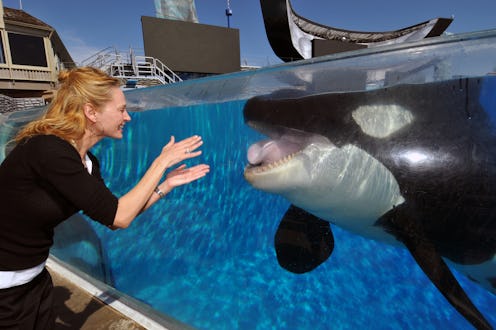News
Controversial Float To Hit Macy's Parade
Go home, SeaWorld, you're drunk. The marine-park chain, best known for providing children with hours of fun and animal-rights activists with fiery outrage, decided 2013 should be the year to make SeaWorld's first appearance at next week's Macy's Thanksgiving Day Parade. All fun and games, right? Not so much. The SeaWorld float will feature a killer whale swimming blithely with its friends — and SeaWorld's famous killer whales, captured from their ocean pods decades ago and now bred by the park, have been implicated in a number of deaths.
SeaWorld is facing a PR storm of late, after this year’s acclaimed documentary Blackfish claimed that the whales had become highly aggressive because the parks had been treated them poorly for years — and, therefore, the human deaths were the fault of SeaWorld.
Faced with decreased attendance and furious criticism from PETA and animal-rights activists (and, um, Alec Baldwin) SeaWorld decided it was high time to, um, participate in Macy's Thanksgiving Parade with a float of happy killer whales. The park chain says that the float celebrates SeaWorld's 50th anniversary, and, no, it's not a desperate PR move. PETA fired back, saying that there's nil to celebrate, and threatened to stage a protest. Macy's, for its part, released a statement saying that it plays absolutely no part in activism one way or another. Translation: We're staying the hell out of this, guys.
SeaWorld has been embroiled in controversy about its whale-captivation program for years, but the emergence of Blackfish at the Sundance Film Festival in January stirred up a lot of fresh anger. In the 70s, some of SeaWorld's capture tactics for whales and dolphins — apparently using airplanes, explosives, and powerboats — led to the chain's capture permit being revoked. SeaWorld owns most of the world's captured killer whales, but hasn't caught any new ones for years: instead, the park breeds its whale population to create new generations of marine life.
Blackfish focuses on Tilikum, a 12,000-pound, 32-year-old killer whale. Tilikum, captured at the age of two (and one of SeaWorld's longest-performing animals), has apparently caused three deaths: that of two trainers, and one visitor. In 1991, a part-time trainer slipped into the pool and was drowned by three orcas, including Tilikum. Eight years later, a visitor apparently slipped past security at nighttime, got into Tilikum's cage, and was found dead the next morning. But the incident at the heart of Blackfish is the 2010 death of Dawn Brancheau, Tilikum's 40-year-old trainer: after a show, in front of more than a dozen park guests, Tilikum brutally attacked and drowned Brancheau. The park was fined $75,000 for safety violations.
Here's Tilikum in 2009.
In PETA's official letter to Macy's, the activism group writes:
You may not know that many of the orcas at SeaWorld were captured from their family pods in the ocean. All are far-ranging animals, traveling in nature as many as 100 miles per day. At SeaWorld, where they live in cramped cement tanks, they are deprived of the opportunity to engage in almost any type of natural behavior.
This same argument is central to Blackfish.
Because of the constant tight confinement. It's no surprise that they become neurotic, self-destructive, and extremely dangerous in captivity.
Not only is SeaWorld's killer whale population dangerous to the guests and trainers by which they perform, PETA concludes, it's nothing short of animal cruelty. But though attendance has dropped by nine percent, there's been no federal move to do anything about the marine park's animal practices. It should be noted that SeaWorld also owns an acclaimed animal rescue and rehabilitation program: tens of thousands of injured animals have been taken in by SeaWorld, helped to recovery, and then released back into the wild.
And SeaWorld insists they're actually thrilled that less people are visiting: “Having a couple fewer bodies in the park is also good for our ratings and the experience as well," said chief operating officer James Atchison, "and we save operating cost.”
